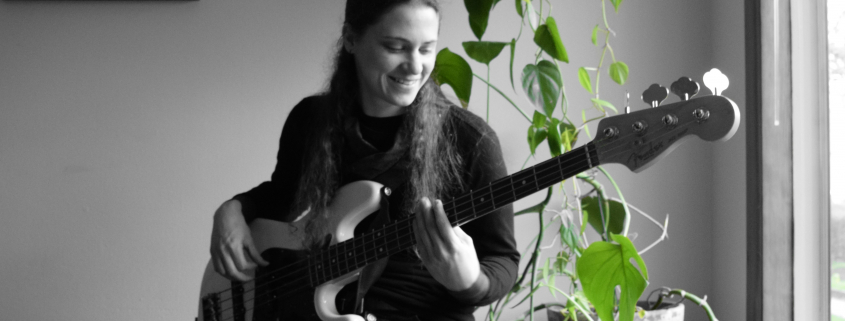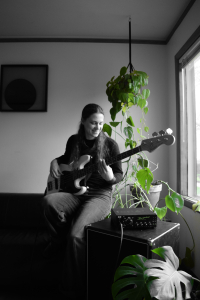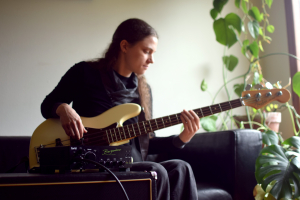Bergantino welcomes Kelly Clifton
Bass playing dynamo, Kelly Clifton of the band J.Graves, was nice enough to sit down with Holly and give some insight to her thoughts and approach of the instrument.
Hey Kelly, what have you been up to?
I am finishing up an LP with J. Graves. I have also been recording two EPs with The Cabin Project. When I am not playing music, I work as a luthier.
So, tell us where were you born and raised?
I was born in Miami, Florida, and was raised in the beautiful Pacific Northwest.
What makes the bass so special to you particularly and how did you gravitate to it?
When I began playing saxophone in my teenage years, I was primarily trained in performing the middle and bass voicings of musical compositions. Later, in my 20s, when I began playing guitar with what became my first bandmate, Stephanie Strange of Strange and the Familiars, I found myself gravitating more towards the bass notes. I began fleshing out pieces of the songs with bass lines, which led me to purchase my first bass guitar.
Every person experiences music differently, and it can affect them in different ways. For me, part of what makes the bass so special is not just the sonic and cognitive experience, but also the physical resonance in my body. I find the vibration of bass is hypnotic, euphoric, and soothing. I like the subtle power bass has to create or change the entire context of a melody, and using that in collaborative songwriting is my greatest musical strength.
How did you learn to play?
I learned by jamming with other musicians. I started with just a few notes and then learned by emulating what other guitar players were doing on their low E and A strings. I really began to progress with bass when I joined a blues and rock cover band and started learning bass lines and styles ranging from James Jamerson to Dusty Hill. From there, I became involved with many musical groups that helped progress my playing, songwriting ability and understanding of my instrument. I enjoy self-learning and continue to expand my knowledge with online resources such as Scott’s Bass Lessons.
Are there any other instruments you play?
I can play piano, saxophone, traditional flutes, guitar, and baritone ukulele.
How has your playing evolved over the years and have you made changes from your start until now- can you describe the changes?
When I began with bass, I didn’t know the note names on the fretboard, and I played by ear as well as by patterns. Since then, I have familiarized myself with the fretboard and unlocked the ability to play what I think, and it has taken a lot of guesswork out of playing. If I feel the music, I can now very easily figure out how to play what I imagine in a way that is more precise and easily communicated with my fellow bandmates. I am now more adventurous, experimenting with how much sonic space I can fill, finding where chords are too much or just right, where less subtle or more lead lines can be brought forth, instead of timidly riding beneath the guitar lines.
Describe your playing style(s), tone, strengths and/or areas that can be improved on the bass.
I approach playing the bass with reverence and try my best to serve the song. I gravitate towards warmer and darker tones and almost exclusively play fingerstyle with flat or pressure wound strings. I am confident in styles like indie, folk, rock and blues, but I would like to be more proficient with metal, slap, funk and jazz improvisation as it is quite different from my current style.
Where do you see the instrument in 5, 10, or even 20 years from now?
As far as the bass instrument, I see bass manufacturers continuing to explore new sizes and materials. For example, Taylor came out with the GS mini bass in the mid-2010s; it was a bass that was so short-scale they had to develop a brand new bass string to accommodate the new string tension. I think it would be interesting to see more basses designed for different kinds of bodies. In a world moving towards more inclusivity, basses that suit more body types would make the bass more approachable by all. As far as materials for the instrument are concerned, there have been serious concerns around sustainability and supply chains. Forestry management and material sourcing abilities will dictate what is available. We’ll likely see more of a departure from using the coveted and traditional tonewoods, which can lead to innovation and unique workarounds in times of scarcity.
Who would you say out of four players that would make the cut as your influencer and why?
Tal Wilkenfeld, Victor Wooten, Paul Denman, and Flea.
When I first began listening to Tal Wilkenfeld, I was impressed with how she held her own with the likes of Jeff Beck and the Allman Brothers, but her solo album is uniquely and genuinely her.
I have appreciated Victor Wooten for some time because he never lost his musicality in the flashiness of his technique. He continually expands what I think is humanly possible on the bass.
Paul Denman may be my all-time favorite bassist. He is not flashy; he creates a mood with sparseness and rhythm. He is like the person who says very few words to you, but makes a bigger impact on your life than an entire book. Even though his technique impresses me, it’s his tone that grabs me the most.
What I like about Flea is while he can play a simple bass line, he can also create memorable counter-melodies. His ability to play hard rock and funk, as well as gorgeous chordal and melodic music, is impressive and inspiring.
Let us know what you are currently working on (studio, tour, side projects, etc.).
I work primarily with two bands. One is called J.Graves, who just finished up an LP titled Fortress of Fun. It was mixed by Sylvia Massy, and mastered by Amy Dragon, who are incredibly talented people we were stoked to work with. We also recently finished shooting six music videos, all with a related storyline, with a choose-your-own-adventure theme. They will be released sometime in 2022.
The other band I am working with is called The Cabin Project, and we are working on a double EP currently being recorded at the Map Room in Portland, Oregon. This EP features some of my most ambitious bass parts.
I work a day job at a violin shop. My career as a luthier began as an apprenticeship, and I have continued to work with masters of the trade who are currently teaching me more advanced violin repair techniques. I am also halfway through my first bass guitar build. The bass is a neck-through, 33” scale, maple neck and walnut body, Hipshot drop D tuning machine for the E string. Pickups/electronics are yet undecided.
How did you find Bergantino, and can you share your thoughts on our bass gear?
One night back in 2018, I went to a jam at a local blues club in Portland. It was hosted by Saxophonist Fenix Sanders and his band. I’d played with Fenix many times in my blues and rock cover band, but this was my first time meeting his bassist, Calen. When I hopped up on stage to play a song, Calen plugged me into his B|Amp and a Bergantino 410 Cab. I still remember playing the first few notes of Bobby Caldwell’s “What You Won’t Do For Love.” That day was the start of my appreciation for Bergantino. In the eleven basses I have played, nothing made as much of a difference as playing through that amp.
The first thing I noticed with the Bergantino gear was the incredibly clear, effortless articulation. It felt like I got ten years better at the bass the moment I plugged in and played. Calen was a great bass player, but at that moment, I felt like I had discovered one of his secrets. In the times when I played with Fenix before, he’d often lean over to me in between songs and ask me to turn my mids up. Little did I know he was completely spoiled by the power and sound of the Berg amp he was used to hearing. At one point, I told him not to worry, that I’d get a Bergantino someday.
Tell us about your favorite basses.
I have owned eleven basses since I started playing in 2012, and both perform and record almost exclusively with my Fender Jazz bass. I find the neck profile of this bass more comfortable for my style. I also appreciate the tonal variety of this bass, I can make it sound beautiful, warm, and soft, and I can also make it growl. It works for all the styles I play.
My second favorite bass is my Aria Pro II Thor Sound bass. It is a 32” scale bass, and its string spacing is very tight, which allows me to more comfortably explore bass chords and stretches that are hard to reach on the jazz bass.
What else do you like to do besides playing bass?
I am a hobbyist knifemaker. I love hiking, particularly in the Columbia River Gorge, or anywhere in the mountains. I really enjoy practicing traditional archery. I also have a not-so-minor ongoing obsession with the show “Xena: Warrior Princess”.
What have you had more time to work on or explore since COVID?
At first I had a lot more downtime, which has helped me realize the importance of physical upkeep as a musician. I now better understand the necessity of balance in juggling my art, profession, and personal life in the less active time of COVID. I also have spent more time on my own with songwriting, which has been a good exploration in relying solely on myself for material.
Is there anything else you would like to share with us?
I am quite curious about electronics and why Bergantino amps and cabs work so well. I am friends with Howard Gee, the head designer of KittyCaster FX Pedals (formerly of Catalinbread), and have had the pleasure of picking his mind about how they designed some of their top-selling pedals. I enjoy learning more from engineers in the musical world, and would like the opportunity to glean more in-depth knowledge about Bergantino products. Knowing more about this would help me connect with other musicians who want to know more about how Bergantino could benefit their sound. I have a mind for the technical details as well as the art of music and would like to share my love for Bergantino in a knowledgeable way.
Follow Kelly:
IG: https://www.instagram.com/boxcar_lucy/
https://www.instagram.com/jgraves.xyz/
https://www.instagram.com/thecabinproject/
Web:
www.jgraves.xyz



